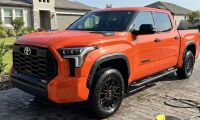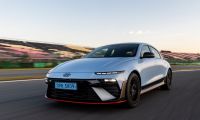You may have noticed a hyped-up controversy attached to the Chevy Volt, the current round of which is the battery pack fire plus side issues like the amount of federal support behind the Volt. The controversy, irregardless of whether there's a real danger, is causing some to suggest that GM should kill the Chevy Volt because it has become a public relations burden. This really raises the question of which direction GM should take, and the direction other car-makers are taking.
An example of the "Should GM kill the Volt" perspective is a Motley Fool article today with that title. It's argument is that GM isn't making much money on the Volt, not many Volt's are being sold. Toyota is selling a zillion more Prius models than the Volt and the Chevy Volt doesn't stack up well against competitor vehicles, and there's the public relations problem. While this line of reasoning has some truth, it's eerily like a replay of the bashing the Prius received when it was first introduced. Go back in time 11 years or so, and you'll see complaints about Toyota losing money on each Prius they sold, how nobody wanted one, then step forward a couple years from that to the Gen2 Prius which sold like hotcakes to make it a highly successful car. A car, by the way, which some still bash.
In part this situation is one of colliding cultural viewpoints that date back to the 1970's oil crises. Those crises led to a wave of highly efficient cars, solar panels on the roof of the White House, and even a decrease in oil consumption. That pattern lasted for a few years until Reagan was elected, removed the White House solar panels, and told us all to go back to driving SUV's.
But let's stay with the present. There are approximately three directions GM could take moving forward.
Should GM kill the Volt? (retreat) This is an unlikely path for GM to take. In part the Volt was GM's opportunity to repair their image after being tarnished with having "killed the electric car" when they shut down the EV1 program. GM almost certainly chose to call the Volt an "electric car" (it's proper description is "plug-in hybrid") in an effort at corporate image repair. If killing the EV1 was a disastrous PR move, killing the Volt would be doubly so, especially after the glowing portrayal of the Volt program in the recent movie "Revenge of the Electric Car."
It's obvious that many want GM to kill the Volt, and the House Oversight Committee meeting next week appears to be staged to create more negative political baggage attached to the Volt.
Yet, does that mean GM's only choice is to cave in to negative PR and political pressure? A couple years ago with the over-hyped controversy over the Prius sticky accelerator problem, did Toyota cave in to negative PR and political pressure? No, they scrutinized the evidence, and developed fixes for the problems they found. Two years later and that controversy is a dim memory in the past. GM is following a similar path with the battery pack fire. They're scrutinizing the design, coming up with fixes, and communicating with their customers to accommodate any fears they might have. The Volt was cleared yesterday by the NHTSA, and perhaps in the due course of time this too will be a dim memory in the past.
And what of the technical reasons to keep the Volt in existence? In total the 7500 or so Chevy Volts in existence have driven enough gasoline-free miles to prevent burning 34,000 barrels of oil in 2011. While that's a drop in the bucket of oil consumption, it's a move in a direction many want to take towards a clean transportation system that ends oil dependence.
Additionally the Voltec drive train is going in to other GM vehicles, and killing the Volt would put GM behind the wave of electrification in the automotive industry. The other auto-makers do not appear ready to abandon their electric vehicle plans, but are moving forward (if cautiously) with additional hybrid, plug-in hybrid, and battery electric vehicles. Are we at the beginning of a wave of vehicle electrification that will shortly become unstoppable? If so wouldn't GM be foolish to retreat from their electrification plans?
Should GM keep the Volt as it is? (stand pat) This, too, is an unlikely path for GM to take because no automaker stands still. They're always working on the next model of every vehicle. A next generation Volt won't come out for a couple years, and in the meantime GM would stand pat with their current design. Perhaps with a few tweaks each year.
There's the "halo car" effect where GM has noted that the Volt has brought new customers to GM, ones who'd never previously owned GM cars. They came to GM looking at the Volt and then perhaps bought something else.
How does the Volt compare against its competitors?
At a $40k price range it's more expensive than the other plug-in hybrids coming this year. Its 40 mile electric-only range is larger than the 10-15 mile electric-only range of those competitors. That 40 mile electric-only range comes because of a larger battery pack, adding to the price. Whether a particular customer buys a Volt or a Prius plug-in or one of Ford's Energi plug-in hybrids will depend on various factors. Where GM targeted an electric range sufficient for typical daily driving distance, Toyota and Ford targeted affordability ending up with a shorter electric-only range.
The $40k price range makes the Volt more expensive than most of the electric cars available in 2012, but here the price differential is smaller. The battery electric cars all have a longer electric-only range than the Volt, generally 100 miles, but they all lack the pragmatic trade-off of the on-board gasoline generator.
Comparing the Volt against the two electric cars with over 100 mile electric range is most interesting. The Coda Sedan has a 150 mile range and a price point similar to the Volt, whereas the Tesla Model S will be built with a 160, 240 or 300 mile range at price points well above the Volt's $40k. Where GM positions the Volt's gasoline generator as the cure for range anxiety, the other cure for range anxiety is to simply have enough battery capacity to give a long enough electric range to cover larger daily driving needs. Obviously the 300 mile Tesla Model S comes with a hefty price tag that very few can afford, but this does point to a continuum of price points a customer could hit. At one end is the Mitsubishi i-Miev whose price is in the $29k range, well below the other electric cars, and at the high end is the 300 mile Model S with a $77k base price, and with several choices in-between.
Should GM create a Volt2, and create more plug-in vehicles? (reenvisionment) As should already be obvious, this is GM's most likely path forward. To keep improving the Volt and to make other plug-in electrified vehicles. They're already on tap to introduce the Chevy Spark EV in 2013 for example. While the Volt is already popular with its owners, there's no reason it cannot be improved upon. A "Volt2" should, similarly to the Gen2 Prius, lead to bigger sales and broader acceptance.
One thing GM could change is the T-shaped battery pack on the Volt. The pack intrudes into the seat, preventing the rear seat from seating three people, unlike most other sedans of its size.
GM could develop a Volt with a shorter electric-only range and much smaller price tag. When Toyota and Ford chose a 10-15 mile electric-only range for their plug-in hybrid EV's, they did so by balancing a large number of factors, premier of which was affordability. The lower price tag opens the doors to a broader range of potential customers, while the Volt's higher price tag limits the potential customers to those who can afford a $40k car.
GM already is developing a range of electrified plug-in vehicles, and could develop even more. The other automakers all have long range strategies to improve gasoline fuel efficiency, reduce vehicle weight, more efficient engines, and adopt electric drive technology, with a long term goal of wide-spread electrified drive train adoption.
An interesting possibility would be a tie-up with either Via Motors or Bright Automotive. Via Motors is a start-up focusing on converting GM trucks and vans to be "extended range electric vehicles" using a pure electric drive train and an on-board gasoline generator, and their vehicles are targeted at construction or utility usages. GM has already invested a small amount in Bright Automotive, who is another start-up focusing on developing an electric delivery van.
In the due course of time there will be battery technology development allowing higher energy density, higher range, at lower cost. Several promising developments are under-way along these lines, and it's not certain when better batteries will be commercially available. When better batteries are available, GM and the other automakers should seize the day, improving electrified car range and cost.
The last thing GM should do is unrelated to the Volt. It would be to pay off the government loans and end the "Government Motors" moniker they've been tagged with. Whether the auto industry or banking industry bailout's were a good or bad thing, the relationship between GM and the U.S. Government is quite unusual in U.S. history. This relationship is an unnecessary aspect of the controversy related to the Chevy Volt.











Comments
Botched execution is the
Permalink
Botched execution is the hallmark of GM and the Volt a shining example.
I went Volt shopping in California and here is what I found:
- A very attractive $5k discount because the Volt's I.C.E. does not comply with Calif. standards for H.O.V. use. I'm not sure but I believe that makes the Volt the ONLY electric currently for sale in the US that is not HOV compliant.
- Only 2 companies will finance a Volt and then only at the "commercial vehicle" fleet rate.
- The very experienced salesman recommended I "unload" the car before the 8-year/100k mile point because of the battery. Not very eco friendly, that.
All in all I found the Volt to be a promising car held back by GM's execution. I walked away feeling GM deserved the Darwin Award.
The problem is always the
Permalink
In reply to Botched execution is the by Consumer_Next (not verified)
The problem is always the same, PR and advertizing positioned it to be more than it was. The Volt was GM's first attempt at a plug-in hybrid, and as such, it was a good start. It's weak points are to be expected form any first series car from Detroit. GM, being GM couldn't wait to test the waters, was in dire need of boosting its image that was sinking to unheard of levels after a terribly handled bailout. If GM gets it acts together, the Converj, the Cadillac version of the Volt should boost the performance and reliability levels, as you would expect a second generation car.
They shouldn't shelf it. They need to swallow the humility pill, step into the new era of business 2.0, loose the ill-fitting pretense and get going. Loose the over the top PR and advertising, it's not fooling too many people these days. The 50s way of doing business by telling people what works doesn't go well, obviously. Consumers are much brighter than GM pegs them out to be.
All in all, it's a good start, not well executed but a good basis into the future. Can you hear us now, GM?
I had no problem financing
Permalink
In reply to Botched execution is the by Consumer_Next (not verified)
I had no problem financing the volt. Your battery comment is probably BS! The only people who botched the launch is the right wing zealots who hate GM, tax credits (even though they won't hesitate to take them), anything that uses less oil, and Obama. The media was all too happy to fall into their trap.
Yeah, what Nick said. Even if
Permalink
In reply to Botched execution is the by Consumer_Next (not verified)
Yeah, what Nick said.
Even if GM is flailing with the Volt, do you think they should cut their losses and ditch the thing, or should they have the sticktoitiveness to see it out to a Volt 2.0 of some kind? If Toyota had ditched the Prius because the Gen 1 Prius wasn't well received, they would never have gotten to the Gen 2 Prius. Whether GM can pull it off is a different question.
Agreed. Beyond right and
Permalink
In reply to Yeah, what Nick said. Even if by David Herron
Agreed. Beyond right and left wing zealotness, the only wing is that based on facts.
The Volt is the first step into a new technological market for GM. GM engineers deserve a lot of credit and hopefully management will take more feedback from them, or why not, actually let them call the shots?
We're all holding our breath to see if GM will take on its biggest challenge, to pull off the transition form "the old GM" to this new paradigm, the electric drivetrain and its inherent business model, politics aside... That, no crystal can tell so far.
They really must stay in the
Permalink
In reply to Agreed. Beyond right and by Nicolas Zart
They really must stay in the game, please; I want them to create a Re-Volt.
Not entirely accurate. Maybe
Permalink
In reply to Botched execution is the by Consumer_Next (not verified)
Not entirely accurate. Maybe you only looked in CA, but pretty much any bank will finance a Volt, just like any other vehicle. And, of course, as of November 17th, as you may not realize, the "Low Emissions Package" option allows the Volt to qualify for CA's HOV sticker. I have to seriously question the qualifications of the salesman you sopke to.
I'm curious, though - did you actually drive a Volt?
Well-thought-out article.
Permalink
Well-thought-out article. The VOLT was designed with some conceptual problems, as a sort of Frankenstein's monster mashup of the Prius (drive train, battery usage and what memory GM had of the EV1.
The best and simplest design would have been looking to real EVs -- but GM managers had no interest in rational or traditional approaches.
Starting with the 30 kWh NiMh battery pack on the Toyota RAV4-EV (120 miles range with 1000 lbs. of tools and 5 persons) normally you would have plenty of range for the day's activities, even without charging. We've found in practice (our family has over 600,000 miles of EV driving) that 120-140 miles is optimal, while 80 is too short.
When and if the battery runs low, then a small on-board genset can start up, restoring range. Some RAV4-EV owners did this on their own; it just uses the ideas of Alan Cocconi's trailer-mounted genset. Note that the genset must be able to meet mobile AQMD standards, more difficult than stationary generators.
Note also that you want your EV to be somewhat empty, so that it can absorb excess genset energy as well as regen braking.
GM might well go back and redesign the VOLT along these lines, instead of looking goofy trying to imitate the Prius.
GM took the Alan Cocconi EV1 motor (upgraded to 120 kW), used the bogus "in line" battery box (should be located in a pan on the bottom, lowers COG), and ignored the 110 mile range of the lead-acid EV1 when it was fitted with PSB batteries.
Will GM revisit the design, and do it right this time?? Not without a serious attack of common sense, unlikely for GM.
After having an 1997 EV1, a
Permalink
In reply to Well-thought-out article. by DougKorthof (not verified)
After having an 1997 EV1, a 2009 Prius and now a 2011 Volt I disagree.
The Volt works great and allow owners to have an affordable hi-performance plugin car at a reasonable price.
The Volt also speaks to a wider consumer base as a short and long range vehicle.
As the majority of trips are short range trips, the Volt allow users to drive gas free.
And with the minority of long range trips, users can still use the same car.
A careful usage calculation by it's maker that IS spot on.
In the meantime new plugin car owners will get addicted to plugging in instead of continuing to use gas with the Volt.
The is the perfect car for me. I drive 97% on battery. But when I need to keep driving I can.
Smart transitional technology.
Any driving on clean electric
Permalink
In reply to After having an 1997 EV1, a by JeffU (not verified)
Any driving on clean electric is a good thing. My problem with the VOLT-hoax is that it was not designed as an Electric car with a range-extender but as a Prius, using the battery to assist the gas engine.
If your "1997" EV1 had been upgraded to the PSB lead batteries, or if you had been able to drive a NiMH EV1 or RAV4-EV, you might have a much different opinion of Electric cars. The Nov. 1996 EV1 had defective Delco batteries; the most we ever got out of it was 90 miles, usually 60; and the pack often failed, we'd be in Saturn of SJC or SA all the time looking for a pack that would not fail.
The PSB lead batteries were very reliable, and often gave us a range over 100 miles. Really, it was Lisa's favorite car of all time: "just give me my EV1 back!!".
The HondaEV always had more than 120 miles range, as did (AND STILL DO) our Toyota RAV4-EV..
So the question is, why should GM start with a Prius, instead of a real EV, for its model??
You're just wrong here, the
Permalink
In reply to Any driving on clean electric by DougKorthof (not verified)
You're just wrong here, the Volt is an Electric car with a range extender, NOT a vehicle that uses a battery to assist the gas engine like the Prius.
I have had my Volt over a year now and only use gas on long trips, which proves the point. Over 12,000 miles I have averaged 105MPG.
If all the misinformation could be cleared up, and also if people would simply go try a Volt, any reported PR problem would be gone in a flash.
PS--complaining about
Permalink
In reply to Well-thought-out article. by DougKorthof (not verified)
PS--complaining about "subsidies" handed to GM for the bailout and the VOLT seems tendentious at best. Consider the huge subsidies handed to BIG OIL and BIG COAL, not just in health costs but in protecting oil supply lines, in cash and in dozens of other ways.
Then there is the issue of military waste. The super-expensive F-22 was known to be flawed from the start, yet the military went ahead with the program. Now, the system is too unreliable for combat, and has never been used for much of anything.
"When a military program lays a turkey, there is barely a peep raised by the media".
I have been driving my Volt
Permalink
I have been driving my Volt since March, 2011. At 11,600 miles, it sports a lifetime average MPG of 123. The winter cold has dropped it to that figure from 144 last summer. Since I live in Massachusetts where the Volt was not available, I had to travel to New Jersey to buy mine.
GM should not, must not, kill the Volt. It is a great car, fun to drive, handles like a sports car. In my case, the $44,800 price tag became ~$50,000 with sales tax and extended wrranty. After the federal rebate, the net was $42,500. Compared to the SUV I was driving before, I will save $3,000 a year on fuel costs. I plan on six years. An anticipated trade in value of $12,000 means the Volt will net me $12,000 by the time I opt for new wheels. $2,000 a year for a car is really good economics.
GM recently offered to buy Volts back from customers upset about the baloney filled battery fires. I told them they would need the jaws of life to pry my Volt away! It is a great car!
A lot of people feel the way
Permalink
In reply to I have been driving my Volt by Leonard Mintz (not verified)
A lot of people feel the way you do: they love the VOLT, and (like me) think the "battery fire" is a bogus (not to say ludicrous) issue. I would be happier if GM would simply make an EV, preferably one as good as the EV1. Lots of EV1 owners just want their cars back. BTW, the LEAF is even more fun than the VOLT-hoax, because the center of gravity is lower and there is no battery box down the center of the passenger compartment. Best of all, we charge our EVs from our rooftop solar system, so no cost either.
I want a Volt SS. The
Permalink
I want a Volt SS. The batteries are too expensive, so a 20 mile range instead of 40 would allow that weight and expense there to be cut in half. Upgrade the 1.4 liter engine to the excellent 1.4 liter turbo from the Cruze, and get the Corvette engineering group to redo the handling. The result could be the most technologically advanced sports sedan in the world.
I want a Volt SS. The
Permalink
I want a Volt SS. The batteries are too expensive, so a 20 mile range instead of 40 would allow that weight and expense there to be cut in half. Upgrade the 1.4 liter engine to the excellent 1.4 liter turbo from the Cruze, and get the Corvette engineering group to redo the handling. The result could be the most technologically advanced sports sedan in the world.
There's nothing technically
Permalink
There's nothing technically wrong with the Volt, but a corrupt corporate culture "too big to fail" is a different matter.
Let's give them another $50 billion US tax dollars so they can shelf EV patents and build 100 acre factories in Russia while holding annual
stockholder meetings in China.
Most "laymen" who never
Permalink
Most "laymen" who never followed the EV industry or the development of the Volt from concept to completion haven't a clue as to what a huge feat is was to deliver a revolutionary quality PHEV on time, and with a state-of-the-art advanced lithium battery pack to boot. Shoot, even Toyota had trouble building a reliable lithium pack for years. GM and its partners, especially LG Chem, are to be commended for pushing EV technology forward in a big way--ditto Nissan with the LEAF. I would love to know the number of patents these two cars alone created.
It's no coincidence that we're now seeing virtually every major carmaker announcing a commitment to EVs of all sizes, shapes, and ranges. And with the industry's embracing of the new federal efficiency guidelines---something Detroit used to fight tooth and nail up to a few years ago--there is all the evidence of a major sea change in the works, one which GM deserves at least partial credit in fomenting.
David Herron's excellent points re the early Prius naysayers and how dead wrong they were are spot on. Bloviating fools like Rush Limbaugh who badmouth the Volt as a lousy car have no idea what they're talking about, and only expose their own ignorance when they try to compare them with an ICE-driven BMW or the like. Many of that generation just don't get it. The Prius led the way and now the Volt and LEAF have taken the baton and run the next leg of the race. I for one find it incredibly exciting, and have no doubt the EV industry will be a major jobs creator over the next several decades, never mind the contribution to air quality and fuel efficiency.
As one who accurately
Permalink
As one who accurately predicted that the VOLT would be the first production EV with a spectacular battery failure as they entered the market, I say it's not what GM SHOULD do but probably WILL do. They already have their hands is the taxpayers pockets, why should they continue on this EV/hybrid track, good or bad, when they can whinge their way to back to their comfort zone of NOT making EVs? Ford will do the Henry Ford thing and build something to out perform the Mitsu. Mi-EV, or at least aim for it. I can see it coming, it's going to be another Kodak moment! Good story Herron, best of all I, get to be the sock puppet now!! LOL